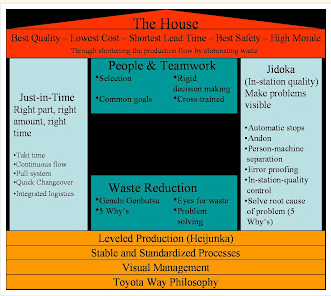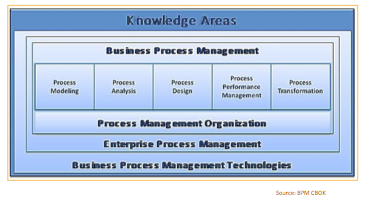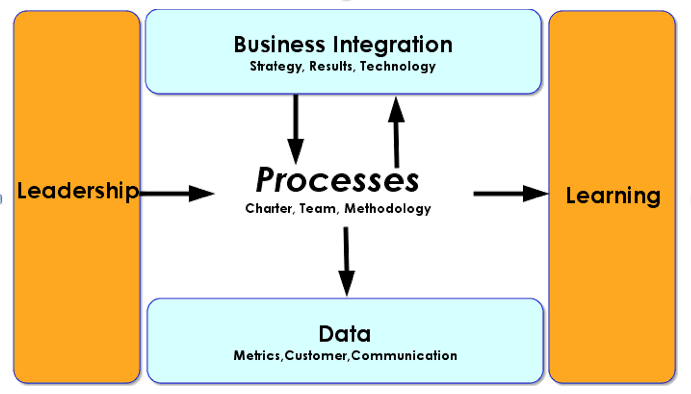There are lots of BPM Methodologies. In fact, I teach a class called BPM Methodologies 2-3 times a year for BPMInstitute.org. The next one is in San Francisco, June 25. But which BPM Methodology should you organization use?
First, let’s define a BPM Methodology.
An approach with principles and specific procedures that provides guidelines for how to approach different scenarios within the Business Process Management discipline.
Most BPM Methodologies have conceptual principles, a graphic model, and specific techniques for the elements within the model.
Some of best known BPM methodologies today are Six Sigma, Lean, BP Trends, Hammer and Rummler–Brache. Below is one of these graphical models for the Toyota Production System (Lean).

The graphical models have many common elements, although the nomenclature may be different. Your BPM Methodology needs to have the critical elements, although you can choose to work on some elements before others, depending on the process maturity of your culture.
Some of the critical elements are:
- Management and Leadership- How will processes be managed, by whom, and how often? What are the key leadership and team roles in the BPM structure and how are they organized?
- Process Improvement and their phases- What are the standard phases of a process improvement project (such as chartering, discovery, analysis, redesign, implementation, and ongoing monitoring)?
- Measurement – quantitative and qualitative data to be collected and acted upon during process improvement projects and in fact, during all the parts of the methodology
- Learning-What training is needed (and in what format)? How do managers and subject matter experts get coached in an ongoing fashion?
- Alignment with Organizational Priorities – How do new processes get identified for process improvement projects or for any kind of continuous improvement effort?
- Continuous Improvement- How are processes monitored and by whom? What data acts as a signal and calls for decisions and action?
- Technology – What BPM tools or suites are you using? Do you have standards?
- BPM common practices – What BPM company standards do you have? How do old practices get evaluated or phased out, and new practices get instilled?
- Change Management – What method do you use currently in the company and how does it apply to your BPM work? How is it incorporated instead of just an add- on?
These may not be all the elements you want to have in your BPM Methodology but they are a good start.
Here additional BPM models–one from the BPM CBOK and another I developed.


Now the trouble with a BPM methodology which only includes a philosophy and a model, is that it needs to be executed against. And that means you need more specifics– the procedures mentioned in the definition. Here are some specifics you need for each of the model elements (based on my model).
| Methodology Element | Specific Procedures or techniques |
| Management | List of all core and support processes; list and definitions of leadership and team roles and responsibilities . |
| Process improvement with phases | Definition of phases; examples of required and optional work products in charter, discovery, analysis and redesign phases |
| Measurement | Data elements for before and after; analytical data elements; customer data, competitive data, and ongoing monitoring data. Decisions from data. |
| Learning | Skills needed for BPM techniques; delivery of training and real time learning; learning for BPM leadership, project and team roles |
| Alignment with Organizational Priorities | Techniques to prioritize processes such as strategic plan, SCOR, Enterprise architecture, 3 x 3 box performance criteria |
| Continuous Improvement | Roles, monitoring frequency, monitoring methods and signals |
| Technology | Standard technologies used across the enterprise. Where are custom technologies used and why? |
| BPM Common Practices | Agreed internal common practices, such as roles, analysis techniques, group, assessment |
| Change Management | Change management model with steps. Method to assess gaps and potential solutions to close gaps. Choice of internal method, or method from external consultant. |
Now which BPM Methodology should you use? It depends:
On what you want to do with the methodology? (if you are just going to do local process improvement projects to start, then define the process improvement phases and techniques for that arena. BPM CBOK or BP Trends have a good outline.
On whether your organization already uses a well know BPM methodology. Then I would find out how widespread the usage is, how it is working currently, and the level of senior management support for it. If most of those answers turn out in the affirmative stick with what you have and add in additional techniques as they are needed, customizing for your organization’s culture.
Or if you want to build your own. Then start with creating a simple but comprehensive overview model and vet it in your organization. Make sure the language has meaning to your company. Steal shamelessly from other methodologies for the specific procedures and techniques. Start with a basic set, the ones you think are ‘required”. Use this basic set in different divisions, with varied leaders, and for different process improvement projects. And iterate them. You do not have to have a comprehensive methodology to start, but you should be clear about the critical elements.
Shelley Sweet a Frequent Contributor for BPMInstitute.org and is President of I-4 Process (Ideas, Involvement, Implementation, Impact) in Palo Alto, California.

















